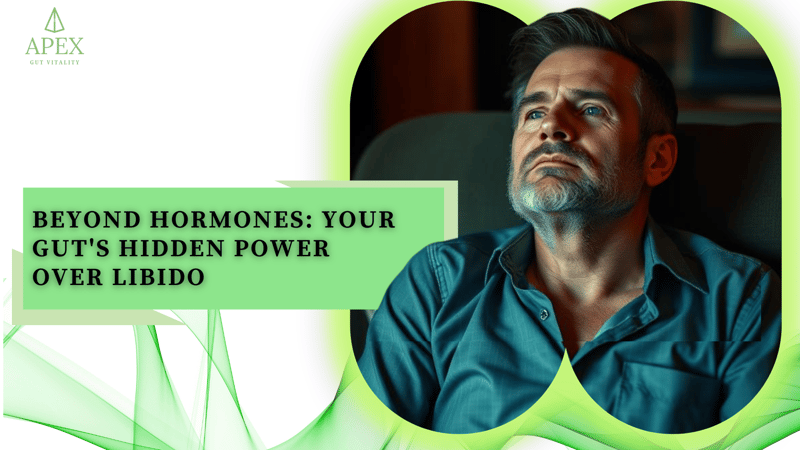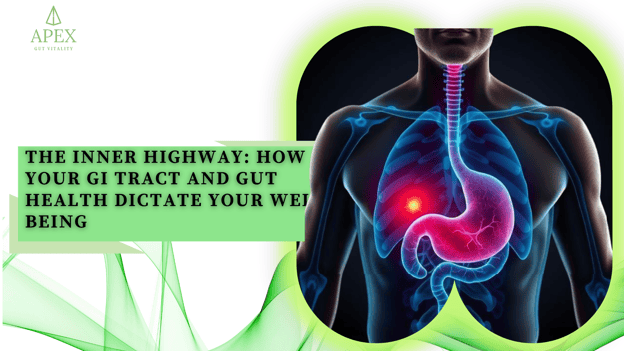Beyond Hormones: Your Gut's Hidden Power Over Libido

For many men, often after 40, a gradual shift in vitality and sexual desire can be a perplexing, even isolating experience. It’s a quiet retreat from a once-vibrant aspect of life, stirring questions about age, stress, and connection. While this subtle diminishment of libido is common, what if a powerful, often overlooked, architect of your passion resides not just in your mind or hormones, but deep within your very own gut?
This post delves into the cutting-edge science, backed by high-impact research in journals like Nature Communications and Frontiers in Endocrinology, revealing an intricate and often hidden link between your gut microbiome and the ebb and flow of your desire. Let's explore how optimizing this internal powerhouse can offer a fresh pathway to reclaiming that lost spark and nurturing a robust sense of masculine vitality.
The Gut-Desire Connection: A Multifaceted Orchestration
Lowered libido is a multifaceted challenge, influenced by hormones, mental state, energy levels, and overall health. Your gut, it turns out, acts as a central orchestrator, pulling strings across many of these critical domains, directly impacting your desire for intimacy.
Hormonal Harmony & Neurotransmitter Symphony: The Gut's Influence on Desire
A primary influence lies in your hormonal symphony. As we've previously discussed, the gut profoundly impacts testosterone and estrogen balance (particularly the estrobolome's role in estrogen metabolism). These foundational hormones are pivotal for sexual interest. An imbalanced gut can contribute to hormonal shifts that directly dampen libido.
Beyond that, the gut-brain axis directly influences your neurotransmitters—the very chemical messengers of desire, motivation, and pleasure. Beneficial gut bacteria contribute to the production and regulation of compounds like dopamine (the brain's reward and motivation chemical) and serotonin (influencing mood and well-being) (Dalile et al., Cell Metabolism, 2020; Strandwitz et al., Cell, 2018). When gut health is compromised, this delicate neurochemical balance can be disrupted, leading to lower mood, increased stress, and a diminished capacity for sexual desire.
The Inflammatory Drain & Vascular Readiness: Suppressing Drive
Furthermore, chronic low-grade inflammation, often stemming from a compromised gut barrier ("leaky gut"), acts as a systemic energy drain. This "inflammaging" can induce profound fatigue, cloud mental clarity, and suppress overall vitality – all factors that actively diminish sexual drive. Your body's resources become diverted to fighting internal fires, leaving little capacity for passion or intimacy.
The health of your blood vessels, crucial for erectile function and indirectly impacting desire, is also vulnerable to gut-derived inflammation and impaired nitric oxide production, further dampening the physiological readiness for intimacy (Carlström et al., Nature Medicine, 2018).
Cultivating Your Inner Resilience: Practical Steps for Rekindling Desire
For the discerning man seeking to revitalize his libido and zest for life, understanding the profound influence of the gut is a transformative step. This isn't about synthetic fixes; it's about embracing a holistic, proactive approach to bio-optimization that targets the root cause, leading to sustained passion and vitality.
- Nourish Your Neurotransmitters & Hormones: Prioritize a diverse, whole-food diet rich in fiber (from various fruits, vegetables, legumes). This feeds the beneficial gut bacteria that produce short-chain fatty acids (SCFAs), which support neurotransmitter production and overall gut-brain communication essential for desire. Consistently incorporate fermented foods (like kefir, kimchi, sauerkraut) to enhance microbial diversity that promotes anti-inflammatory processes and helps balance hormones crucial for a healthy libido.
- Defuse Stress to Reignite Passion: Chronic stress profoundly impacts both your gut microbiome and your sexual drive by altering hormonal balance and neurotransmitter activity. Actively integrate stress-reduction practices like mindfulness, deep breathing, or spending time in nature. Calming your nervous system helps restore a favorable internal environment for intimacy and overall well-being.
- Make Gut-Smart Choices for Vitality: Be judicious with medications, especially antibiotics, as they can disrupt your delicate microbiome, potentially impacting hormonal and neural pathways linked to desire. Discuss alternatives when appropriate and prioritize robust gut support (e.g., targeted probiotics) to safeguard the microbial balance critical for sexual vitality.
- Prioritize Restorative Sleep: Quality sleep is vital for both gut repair and optimal hormonal balance, including those that influence libido. A well-rested gut supports the intricate processes necessary for physical and mental readiness for intimacy, fostering a stronger sense of desire.
Conclusion: Your Gut, The Code to Enduring Passion
The quiet retreat of libido, though often unspoken, holds a significant emotional weight. Yet, the emerging science of the gut microbiome offers a powerful, empathetic explanation and, crucially, a clear path forward. By understanding and intelligently nurturing your internal ecosystem, you are not merely seeking a superficial boost; you are engaging in a profound pathway to recalibrating your hormonal symphony, enhancing your mental landscape, and reigniting your innate capacity for connection and desire. Heed the whispers from within – a robust gut is the code to unlocking enduring passion and a vibrant future.
Question (please comment your answers below)
Inspired by this insight into the gut-desire connection, what's one single, actionable step you feel ready to embrace this week to start rekindling your vitality, increasing libido, and reclaiming your spark?
References:
Carlström, M., Lundberg, S. J., Larsen, F. J., & Lundberg, J. O. (2018). The oral and gut microbiome as a nitrate-nitrite-nitric oxide pathway. Nature Medicine, 24(3), 256-261.
Dalile, B., Van Oudenhove, L., Vervliet, B., & Verbeke, K. (2020). The role of short-chain fatty acids in gut-brain communication. Cell Metabolism, 32(6), 940-953.
Strandwitz, P., Kim, T. T., Terekhova, V., Chaen, S., Cannavo, E., Sharma, V., Logan, R. W., Edelman, S., Rojahn, T. F., Yano, J. M., … Clardy, J. (2018). Gut bacteria produce a neurotoxin modulating host serotonin levels. Cell, 173(6), 1355-1368.e17.



